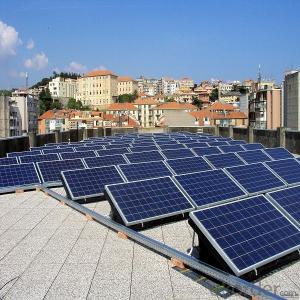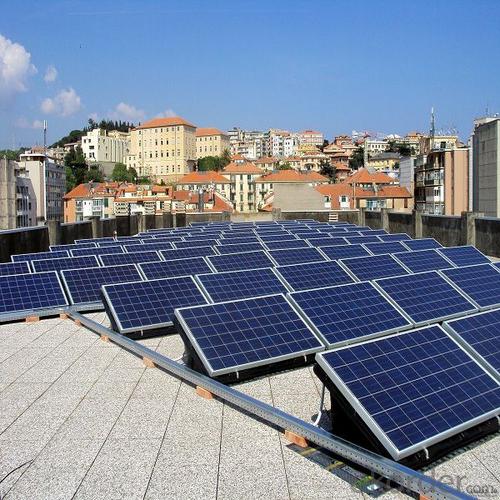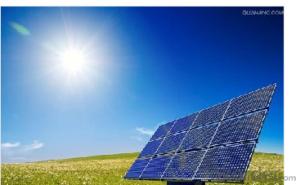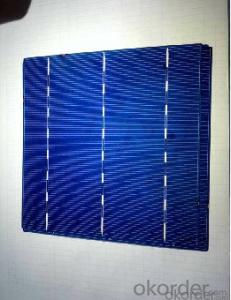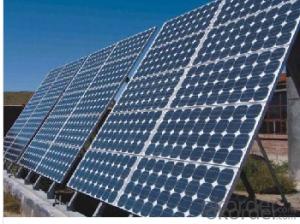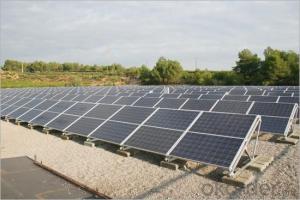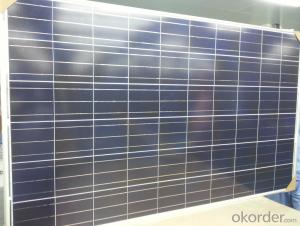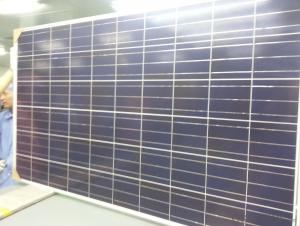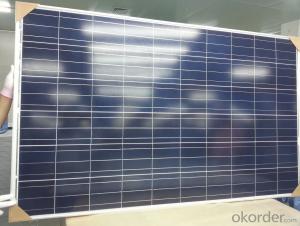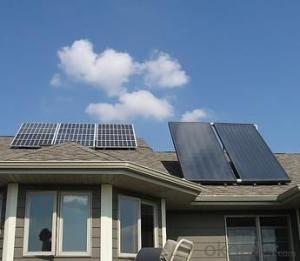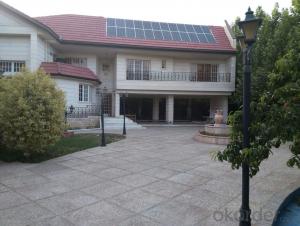Solar Panels for Home Use - Poly 220W Solar Panel / 30Vmp with Good Quality
- Loading Port:
- Shanghai
- Payment Terms:
- TT OR LC
- Min Order Qty:
- 100 watt
- Supply Capability:
- 10000 watt/month
OKorder Service Pledge
OKorder Financial Service
You Might Also Like
Specification
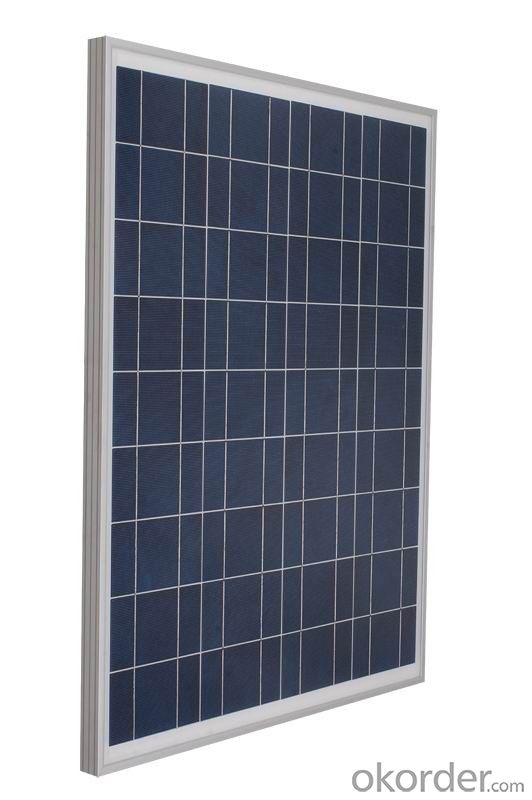
Product Description
220W Poly Crystalline Solar Panel
Product Highlights:
1. Guarantee positive power tolerance (0~+3%)
2. Module can bear snow loads up to 5400Pa and wind loads up to 2400pa
3. High performance under low light conditions (cloudy days, mornings and evenings)
4. Certified by Europe standards of TUV, IEC, CE and British MCS and AUS CEC
5. OEM/ODM available
Specs
| Electrical Characteristics | |
| Maximum Power [Pmax] | 220W |
| Power Tolerance | +/-3% |
| Maximum Power Voltage [Vmp] | 29.00V |
| Maximum Power Current [Imp] | 7.59A |
| Short-Circuit Current [Isc] | 8.38A |
| Open-Circuit Voltage [Voc] | 36.4V |
| Module Efficiency | 13.52% |
| Max. System Voltage | 1000VDC |
| Cell Size and Series | Poly 156*156 60pcs (6*10) |
| Temperature Coefficient of Pmax | - 0.47% / º C |
| Temperature Coefficient of Voc | - 0.33% / º C |
| Temperature Coefficient of Isc | 0.05% / º C |
| Mechanical Characteristics | |
| Dimension (mm) | 1640*992*40 |
| Frame | Anodized Aluminium Alloy |
| Glass | 3.2mm,High Transmission,Tempered Glass |
| Junction box & Cable | IP65 Rated weatherproof connectors Cable: TUV 1x4.0mm2 / UL12AWG,Length:900mm |
| Weight | 19.0Kgs |
Industry-leading Warranty:
Warranty on material and workmanship: 10 years
Guaranteed output of 90% after 12 years and 80% after 25 years.
- Q: So, I've seen cheap solar panel kits for sale from Harbor Freight, and regardless of whether or not I were to buy a set from them or someone else, I was wondering what the process of implementing a small-scale solar system into your household electrical system would be.I've read articles that started out too in-depth or were speaking of systems on a much larger scale.Can it be as easy as buying the panels and inverter, and plugging it into a socket, or is there more to it?Some of the articles I was reading had mentioned having to contract with your electrical supplier, having to have an electrician tie it all in in some special/ necessary way, using a battery pack (would this be necessary for a tied-in system?), or using the system to only power single items, like a water heater, or plugging items into a connected battery-pack, all of which I'm not sure is necessary or needed for what my goals/ means are/ would be.
- Take okorder /... This unit produces 45W for $90. Inverter is extra. Let's say this unit produces that amount of power for a full 2 hours a day, that's 45W * 2h = 540 Wh or 0.54kWh. If I save that from my electrical company, I would pay about 5 cents. $90 then takes 3800 days or 0 years. At that point, you haven't actually made any money, you've simply recovered what you paid out to buy the unit 0 years ago. Yes, electrical power prices will be going up over the long term but the output of this unit is also not going to be 45W over its lifetime (if it even lasts 0 years) so I really question the economics.
- Q: I remember hearing somewhere that solar panels may attract light rays away from plants thus having a potentially negative effect on the plants. I can't remember where I heard it but I'm curious if there is any truth to it.
- not so. the sun shines on the earth and everything on it. the solar panels are on the earth like on top of your house maybe.if they were not sitting on top of your house , the sun would still be shining on your roof. it makes no sense to say they were drawing light away from other plainest when the sun would still shine on the place where they are if they were not there.
- Q: Can solar panels be used for powering a research facility or laboratory?
- Yes, solar panels can be used to power a research facility or laboratory. Solar panels convert sunlight into electricity, providing a sustainable and renewable source of power. By harnessing solar energy, research facilities and laboratories can reduce their reliance on traditional energy sources and contribute to a greener and more environmentally friendly operation. Additionally, solar panels can be integrated into the existing infrastructure of the facility, making them a viable option for powering various scientific equipment and systems.
- Q: Can solar panels be used to heat water?
- Yes, solar panels can be used to heat water. Solar water heaters use the energy from the sun to heat water, typically through the use of solar thermal collectors. These collectors absorb solar radiation and transfer the heat to a liquid, which is then circulated to heat the water. This renewable and environmentally friendly method can be used for residential and commercial purposes to provide hot water.
- Q: How much sunlight is needed for solar panels to work?
- Solar panels can work with any amount of sunlight, but they are most efficient when exposed to direct sunlight for at least 5-6 hours per day.
- Q: Are you a Solar Panel Specialist/Genius/Enthusiast?
- No, just an amateur. I guess that could be called an Enthusiast. I think most people find the topic somewhat interesting, some more than others. Why do you ask?
- Q: Im curious because I read about a boy who invented a 3d solar panel, using a pyramid he designed a solar panel that collects light more efficiently. Now I have a question. Why cant I design a solar panel that takes adventage of convex and concave mirror's and use a surface that collects light and then focus's the suns energy into a beam and take the beam into a chamber where the solar panels are sitting and surround them with mirrors as well, so any light not obsorbed by one particular spot is reflected to another area for reabsorbtion. I know solar panels dont absorb light but perhaps that will allow more light to create the effects it needs.
- I okorder /
- Q: I'm looking for some advice on hot water solar panels. I'm trying to save some money on electricity. A neighbor has been suggesting solar powered equipment for some time now, and I think he's right. It does save quite a bit of money in the long run. They're kind of expensive though, so I'm looking for cheaper alternatives.
- Solar Power is great. I installed it myself about 2 years ago, and you really do notice the change within the first couple months. Building it yourself is actually pretty tricky without the right resources. Some of the guides don't have enough detailed information that you need when you start putting the project together. I was having a lot of trouble until I stumbled upon a site that was offering some great resources for solar DIY projects. I went ahead and added it to the sources section below. It's great and has everything you would need for putting your own solar projects together, including hot water solar panels. Hope this helps!
- Q: Looking to install solar panels in my house.
- Wholesale prices for BP solar panels range between $335 for the 40 watts panel to $835 for the 70 watts panel. Here's a brief listing of wholesale prices for BP solar models: - BP340J solar panel (40 watts) @ $335 - BP350J solar panel (50 watts) @ $37 - BP375J solar panel (80 watts) @ $504 Right now I'm getting a series of 50 watt (7.5 volts) panels installed in my house. It's a start to reduce dependence on electricity bills and try get some tax rebates as well.
- Q: Can solar panels be installed on waste treatment plants?
- Yes, solar panels can be installed on waste treatment plants. In fact, waste treatment plants provide ample space and suitable infrastructure for the installation of solar panels. This can help offset the electricity consumption of the plant and reduce its carbon footprint, making it a sustainable and environmentally friendly option. Additionally, solar panels can contribute to cost savings by generating clean energy on-site.
Send your message to us
Solar Panels for Home Use - Poly 220W Solar Panel / 30Vmp with Good Quality
- Loading Port:
- Shanghai
- Payment Terms:
- TT OR LC
- Min Order Qty:
- 100 watt
- Supply Capability:
- 10000 watt/month
OKorder Service Pledge
OKorder Financial Service
Similar products
Hot products
Hot Searches
Related keywords
